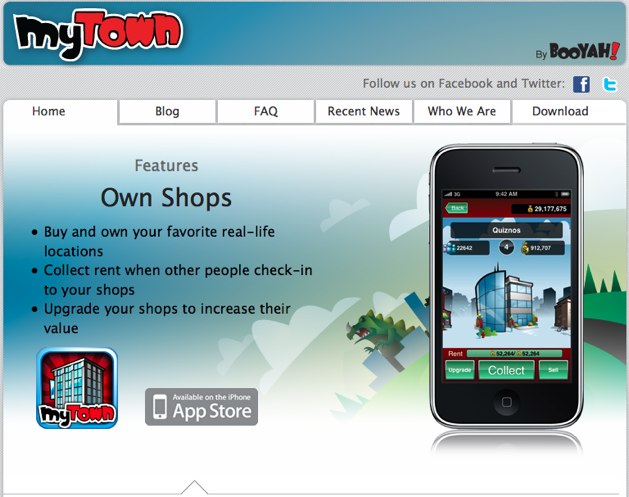Booyah is the not-so-little location based engine that could. The company behind MyTown has raised $20 million in new funding from a group of investors led by Accel (current investors, Kleiner Perkins Caufield & Byers and DAG Ventures, also participated in this round). Accel’s Jim Breyer, a board member of Wal-Mart, Dell and Facebook, will join Booyah’s board. (According to a source close to the deal, the valuation was sizable but definitely under $120 million.)
For months, the location based market has been dominated by Foursquare drama, as Dennis Crowley’s “well-oiled machine” (his words), attracts buyers, adds users and snaps up high-profile partnerships, like its recent deal with NBC. In terms of hype, Booyah has taken a backseat to Foursquare’s billion-dollar-shine but Booyah is chugging along quite nicely.
The company has now raised $29.5 million since 2008 and MyTown has more than 2.1 million users, according to CEO Keith Lee. While Foursquare has yet to reach that milestone, Booyah is preparing for serious acceleration. Lee says Booyah will hit 6 million users by the end of this summer across MyTown and its future products(!).

It’s not exactly fair to compare Foursquare and Booyah, Foursquare focuses on social utility, Booyah focuses on gaming, but both are trying to unlock the power of the check-in and create a massive user base. Booyah, via MyTown, is trying to merge a virtual gaming world with the real world. Users can check-in to real world locations to unlock virtual rewards, they can also “purchase” their favorite properties, collect rent from others and update their properties. Like Foursquare, you can see where your friends are checking-in and pick up local deals.
Lee says MyTown and its unnamed, new products (he was tight-lipped on details but expect major announcements in the next few weeks) will build on that base with a host of new features that will increase the value of the check-in experience. Lee talked in abstracts, but he is interested in adding layers of information on top of the basic GPS check-in: “it’s about validating the activity you do in the real world— a check-in only takes you 70% there.” Booyah is interested in unlocking the information surrounding a check-in through QR codes, bar code scanning, the Facebook Open Graph, etc. For example, instead of just checking into your gym, imagine if you could easily transmit information about your workout, or if you’re at a store, automatically telling your friends what items you like. It’s not clear how these new tools will be implemented but they obviously represent a huge opportunity for Booyah and others, if properly executed. If MyTown, or one of Booyah’s mystery projects, became a popular retail/shopping tool, Booyah would amass valuable consumer data and possibly new monetization opportunities.
On the subject of monetization, Lee would not disclose whether Booyah was in the black, but revenues are indeed rising. Earlier this month, MyTown was averaging 6.7 million virtual item impressions per day, now it’s averaging 8.3 million a day (or 250 million a month). Why does that matter? The popularity of paid virtual goods, which account for 1/3 of MyTown’s revenues, is fueling growth— although the MyTown iPhone app is free it’s a frequent member of Apple’s Top 50 grossing list thanks to the large volume of virtual purchases. Booyah is also making money from paid partnerships with large clients like H&M and the Travel Channel. Lee says he’s quickly shoveling money back into the company, to expand their product, prepare for the move into foreign markets and to grow the staff. He says a major portion of the new funds will be used to hire the right talent— expect Booyah to nearly double its staff from 24 to 40 by the end of this year.